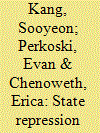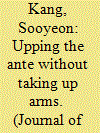| Srl | Item |
| 1 |
ID:
155781


|
|
|
|
|
| Summary/Abstract |
In this article, we review decades of research on state repression and nonviolent resistance. We argue that these two research programs have converged around six consensus findings. We also highlight several areas of divergence, where greater synthesis between the research on state repression and nonviolent resistance might prove useful. We draw attention to remaining controversies surrounding the association between state repression and nonviolent resistance—particularly regarding different theoretical assumptions about structure, agency, and strategic choice; measurement challenges for both repression and dissent; methodological challenges regarding endogeneity, multicausality, and equifinality; and moral hazards associated with the study of nonviolent resistance and the effectiveness of repression. We conclude by highlighting some productive ways forward.
|
|
|
|
|
|
|
|
|
|
|
|
|
|
|
|
| 2 |
ID:
190021


|
|
|
|
|
| Summary/Abstract |
One of the unresolved puzzles in the civil resistance and contentious politics literatures is why some movements that begin seeking limited redress in a certain policy space escalate their claims to demand the ousting of a national leader or the entire regime, a process the article terms ‘demand escalation’. For instance, in the summer of 2019, thousands took to the streets of Hong Kong to protest about a proposed extradition bill that would allow criminal suspects to be sent to mainland China to face trial in courts controlled by the Communist Party. However, even after Hong Kong’s leader, Carrie Lam, announced the formal withdrawal of the controversial bill, protests continued with some calling for greater democracy and others demanding Lam’s resignation. Whereas most of the literature on civil resistance treats demands as fixed and focuses on different methods of struggle to pursue predefined ends, this article shows that demands can change as a result of the state–dissent interaction. The article argues that movements are more likely to escalate their demands when the state responds to the initial nonviolent action with a disproportionate use of force, because such an action intensifies the grievances the protesters have against the state and betrays the remaining trust that people might have had in the government. The analysis of a new quantitative dataset that catalogues both reformist and maximalist opposition campaigns globally supports this claim. By incorporating non-maximalist campaigns into the analysis and not treating demands as fixed, this article adds to our understanding of mass campaigns and highlights an overlooked means by which nonviolent campaigns can up their ante without resorting to violence.
|
|
|
|
|
|
|
|
|
|
|
|
|
|
|
|